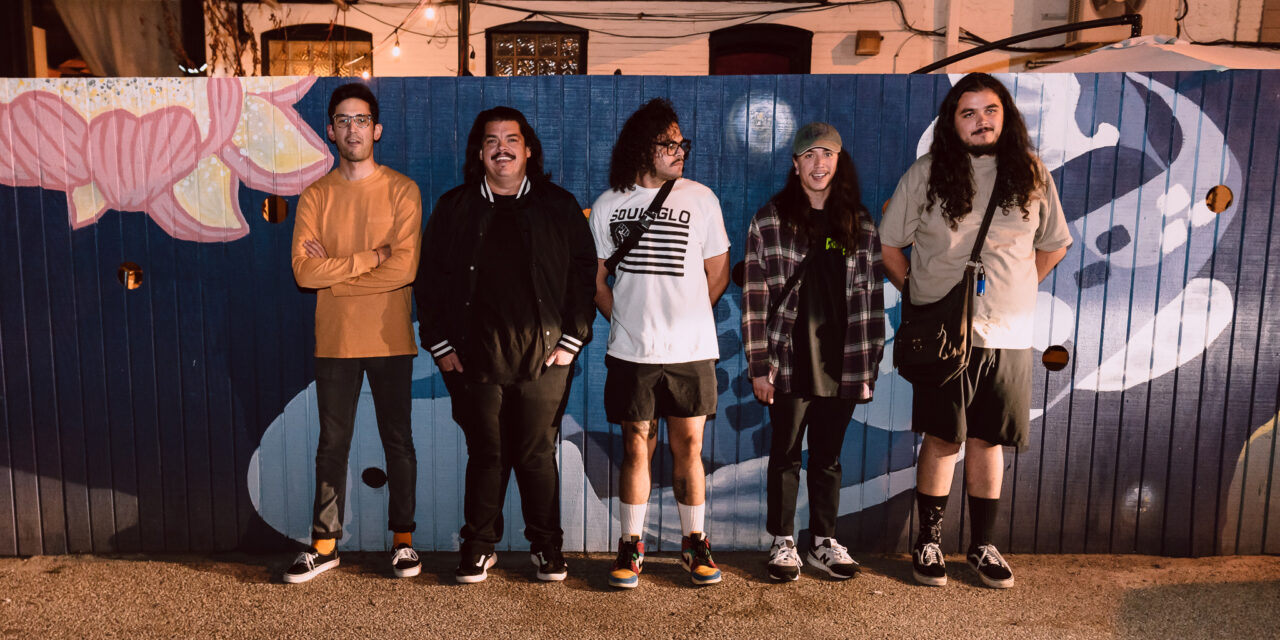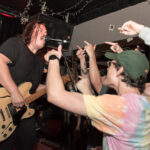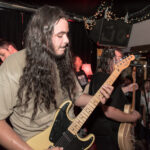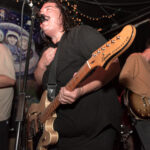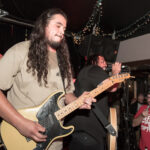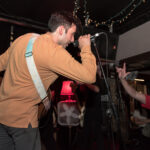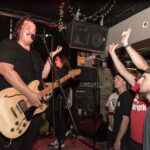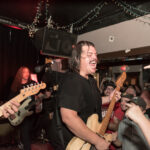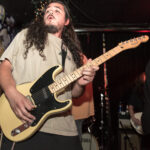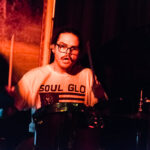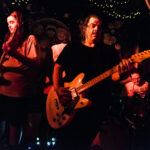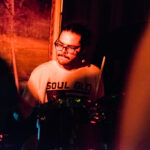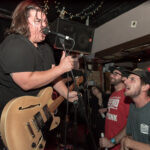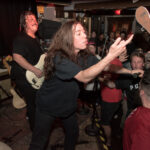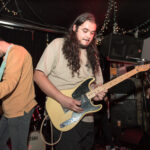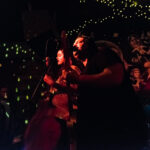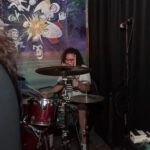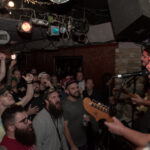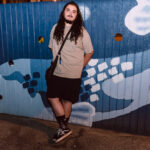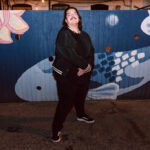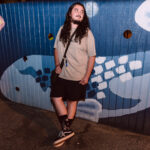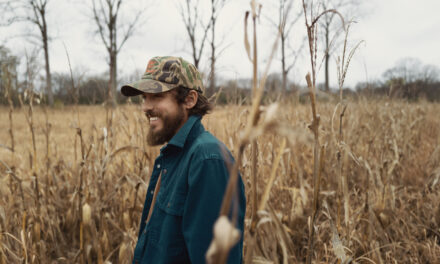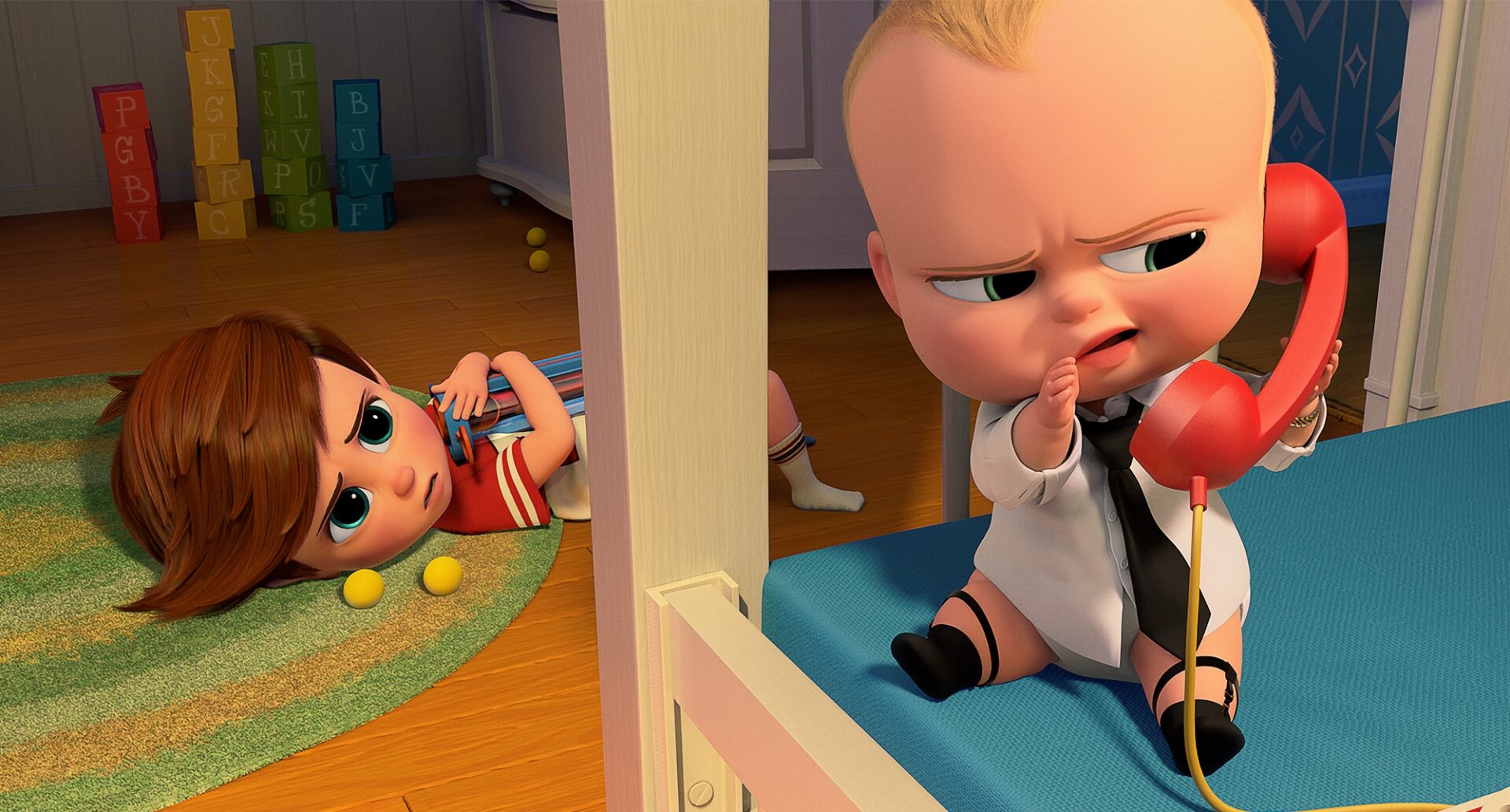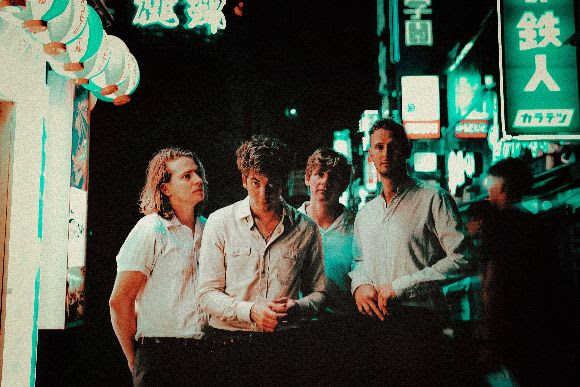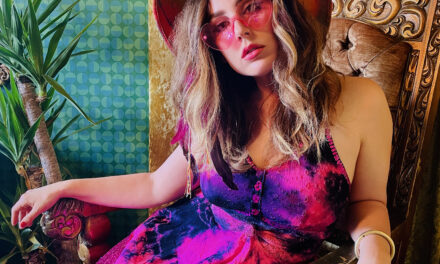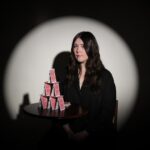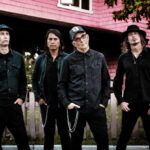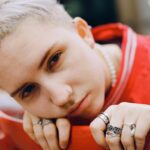The first time I saw Forever Came Calling, I swear my life changed. It was March 2012, the second semester of my junior year of college; after a stressful week of midterms, I drove from my campus in Cleveland down to Euro Gyro, a pizza shop in Kent, Ohio, that already held a lot of memories. I’d first heard “Front Porch Sunrise” a few months prior on Tumblr, and when Forever Came Calling played it in front of me, a spark of hope lit in my chest.
I’d never heard anyone sing with as much conviction as Joe Candelaria, FCC’s guitarist and lead vocalist. I captured the moments I could in photographs, but I was entirely swept up in what was happening around me. It felt like magic. Four months later, on July 24, 2012, Forever Came Calling released their debut album, Contender. With “The Office,” “Ides,” and “I’ll Be Better I Promise,” that spark in my chest grew into a wildfire.
That’s not to say Contender is a “happy” record; rather, there’s something powerful about how direct the lyrics are. The title track, “Contender,” opens with Candelaria declaring he’s “half the man I thought I’d be, double his size and constantly drinking.” Yet in all of their vulnerability, Forever Came Calling remained self-aware, singing about their perspective and emotional experience – a fact that has helped Contender feel as relevant ten years later as it did upon release. Earlier this year, they announced a show at Chain Reaction in Anaheim, Calif., that soon turned into a full tour to celebrate the album – as well as a vinyl reissue and a remixed/remastered version of the album by Sam Pura.
This interview was conducted at The Grape Room in Philadelphia, a city Forever Came Calling has been to many times. Their first time in the area was at a tattoo shop in New Jersey, where they played with Major League, Broadside, and Giants at Large. It was the start of some long-term friendships: a few years later, in 2016, when Major League headed out on their farewell tour, Forever Came Calling joined them again.
Therapy and the recent discovery that he has ADHD (Attention Deficit Hyperactivity Disorder) have changed how Candelaria views himself – and how he approaches work and creativity. After some time at home, he’s now more dedicated to the band than ever. It’s no surprise that he had a lot to say – and I had a lot of questions to ask! – so, to fully portray what was said on both ends, I’ve shared the interview in a question-and-answer format. The conversation below has been edited for length and clarity.
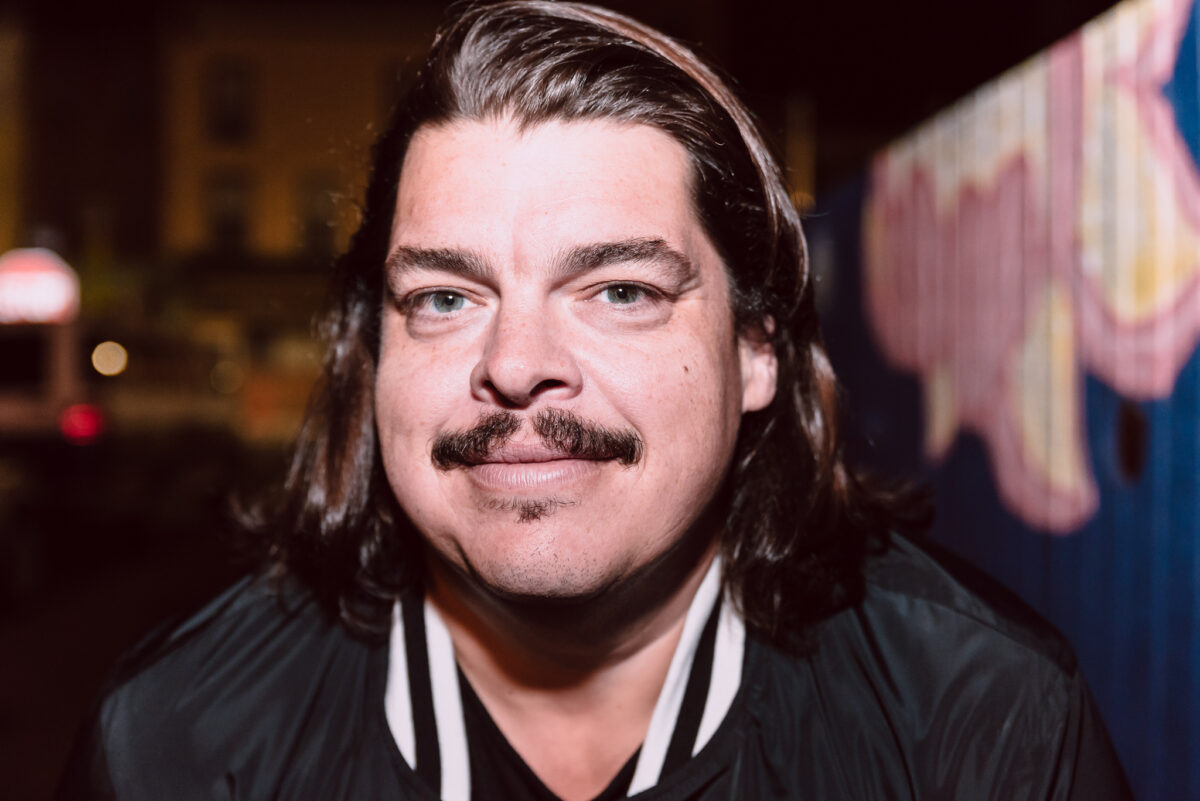
Molly Hudelson: We were saying before we started recording that I’ve known you for over ten years. And I remember where I was in my life when I first saw your band, when I first had written about your band, but I’ve never interviewed you – but here we are. We’re doing it.
So, you’re on this tour for Contender 10 years. But I remember earlier this year, you announced this Chain Reaction show. At what point did that become this tour?
Joe Candelaria: So we announced the Chain show. When we all talked about it, initially, it was gonna be the original lineup. We were like, “Yeah, let’s do Chain.” Me, Bryce [Esquivel, drums], and John [Swaba, bass], right before the pandemic, we played at Chain. We played with that band Bearings.
MH: They’re sick. I love Bearings.
JC: We got asked to open the show, so we were just like, “fuck yeah, let’s do it.” And we had a lot of fun, and then, you know, the pandemic happened. Immediately, we started talking – like, “oh man, whenever this thing ends, it’d be fun to start jamming again. I miss it.” And it was very natural and we started doing that.
[We] talked to our manager. And we were like, “Hey, we would love to do, like, one show at Chain.” So, he booked it.
MH: How far is that from Twentynine Palms?
JC: Like two and a half hours. So, it’s our home show.
MH: But Twentynine Palms is not a city, right?
JC: It’s a city, but it’s not a tour-stop city. It’s, in the best way possible, small-town America. So, it’s a very cool local scene, but it’s like, my friends that I grew up with, you know? Which is awesome, and I love that, but – they would come out to see my band; I don’t know if they would be stoked to go out and see bands regularly.
We book Chain. And then, as soon as we booked Chain, we started getting hit up by a lot of different people being like, “Hey, this, this, this,” and our manager entertained some offers – we were like, “well, what would that look like?” And then I think he was super into it. He’s a big believer in the band and thought this could be something really cool and special. Next thing we knew, he was like, “Here’s what we could do, if you guys want to”- and it was like 17 dates, and we’re all like, “fuck yeah, let’s do it.”
MH: I am so excited to be here. I’ve been looking forward to this, and it’s so fun for me to see that, like – you have Handguns on a few shows, who were some of the first people you toured with when you first came out to the East Coast. You had Nominee – they’re not on here tonight, but the first time I saw you was with I Call Fives with Chris Mclelland. In a way, it’s like a reunion, but it seems like you all have stayed in touch over the years. And then you bring on Homesafe, Death Lens, and Pollyanna, who are awesome. They’re so good.
JC: What I really like about this tour lineup is that it is a reunion, right? The further away I get from when the band was a full-time touring band, and the more I reflect, the more I understand how I feel about it. I think that I definitely struggled with what I felt about music in general. To be completely honest, the music industry has a way of fucking with you in ways that you’ve never even thought you could be fucked with. I think for me, a lot of that was body issues and things like that.
MH: You’ve been on a few podcasts and done some interviews recently. There was one where you were talking about the song “Contender” and body image. And I had no idea some of the stuff you were saying about people you’d worked with in the industry and everything. But at the same time, it doesn’t surprise me.
JC: This is not meant to shade on anybody specifically, but I think it’s more like, that notion and that idea that FCC has always been labeled as either a “fat band” or a “brown band” or a “fat brown band,” and that’s the truth. I think that was something in the moment that I kind of just took and was like, “It’s fine. We get to do this thing.”
MH: Like, “We’re the fat band, but we’re still a band. We’re still doing this” – so you just kind of take it.
JC: Yeah! And then you don’t realize how dehumanizing that is until you go home. And you’re like, “well, I have nothing to show for being in this box that I’m not allowed to escape.” And so when the band stopped touring full time, I definitely had a very sour taste in my mouth with the industry itself, with all of the business side. I think I was very disenchanted. I was burnt out, you know? We were road dogs. We did everything that we were supposed to do.
MH: You were touring constantly.
JC: My mom got sick. It was like, “fuck this,” pretty much. So this tour is a big reunion because I think I had to go home. The universe had to put me home. I needed to go home. I didn’t know it, but I needed to go home.
Going home, I was able to work through my shit in therapy and understand that, no, I don’t give a fuck. I love that we’re the fat brown band. That shit is sick, cuz we still have people that show up and – it’s not a billion people, but it’s people who really give a fuck and saw something and connected with the music – that, to me, is so special.
So, of course, the lineup’s gonna be reflective of that headspace. Handguns brought us on our first full US tour. That band has always, anytime they could help us out, they have. I want them to be a part of every chapter of FCC. Nominee, the same thing. Chris has always been a great guy. Steve, all of those guys are great. Homesafe, we did Ryan’s first full US tour. He plays in Knuckle Puck. We’ve known Ryan forever. And that band is the best band doing this shit actively. So having them is a no-brainer. Pollyanna’s the sickest band on this tour. Well, Death Lens and Pollyanna are tied. They definitely bring that young, punk energy. Jill [Becektt, lead vocalist/guitarist of Pollyanna] has super command of the stage. Death Lens, they’re a young punk band from LA that has never been to the east coast, and they’re fun as fuck. Their frontman works his ass off. It’s great. They’re sick. They bring a cool vibe.
MH: I wanna get into Contender, the record itself. We talked about the song itself, but Contender, why is that the title of the record?
JC: The record was supposed to be called Only Connecting. I was a big Jack’s Mannequin fan; it felt very Jack’s Mannequin. I was like, “It’s all gotta mean something.” Once I got over that idea, I wrote the line “contender for everything.” I really liked the idea of a simple record name; a one-word record name was what I wanted. I felt like “Contender” was really where the band was at. We were young and scrappy and weren’t supposed to win. But every time you put us up against somebody, it’s like, “What the fuck? That band’s good” – and it’s like, “yeah, we’re good – we’re a band!” Like – what the fuck?
MH: Do you feel like, because you are seen as “the fat brown band,” in your words, that people underestimated you because of that?
JC: Oh, a hundred percent. The amount of times I’ve been told, “you don’t look like a singer” – I don’t even know what that means. What does a singer look like? That’s crazy. Just super passive-aggressive things that people don’t realize – it’s kind of offensive.
MH: It is! I have a different perspective, but I’m also not a small person, and being a woman, you would see bands making girly shirts or stylish shirts. And those always run so small. So it’s like, “oh, well, you can be here, but you don’t get to be a woman and also be this big.”
JC: You get to pick from socks or CDs or some random merch. That’s why we, a hundred percent, go up through 4XL, cause yeah, bro, that shit sucks. Shirts are cool, and everybody should be able to wear a shirt they wanna wear.
I think in this scene, especially at that timeframe, there was an image, and if you weren’t that image, then it wasn’t gonna work. And I think that FCC worked in spite of that… it was successful to us. Cause it’s special to us.
MH: And it’s connected with a lot of people, yeah.
JC: It’s connected with who it’s connected with, and I’m thankful that it’s connected with anybody.
MH: Yeah. Something kind of on this tangent – you’ve been exercising a lot. You post a lot about weightlifting, hiking, and stuff. What’s the motivation of that for you?
JC: Not dying! No, uh – honestly, being that large was an experience that mentally changed how I viewed the world. I very much was like, “I can’t do that.” For somebody that was talking about “contender” and shit, a lot of like, “I can’t. That’ll be hard. That’ll hurt. That won’t feel good.” I think I got really tired of that. I have ADHD; I love serotonin, so I’m looking for that all day, and I wanted to get that same hit by taking care of myself. I want to go out and be able to walk. I’m able to walk and hike in cities that I’ve been to 25 times, and I’ve never seen anywhere outside of, like, a one-block radius. I get to walk in cities and check shit out and, you know, use my body to do cool shit, like climb mountains.
MH: Yeah. I love that. In terms of themes of the record – as I was taking notes and writing my questions, something that came up for me was hope – the record gives me this really intense hope. I spend a lot of time on it. And I think what I get from it is vulnerability. On “Harbours,” you say, “of all the places I’ve ever been, inside your heart, I fear the most” – and yet here you are being vulnerable. You’re doing the exact thing that you say scares you. I’m curious if hope if that was a theme that was in your mind at all as you were writing.
JC: Oh, a hundred percent. My mom definitely raised me to be a glass-half-full kind of person. So I think that I feel best when I’m in a situation where I can see the silver lining. I’ll always try to find the silver lining. It’s a positive outlook. I like to try to have that if I can. I’m not always there, but if I can, I try to.
MH: On that vibe of positive outlook – and maybe this is biased by my own experience – something I get from the album is someone who has been to a bunch of therapy, and things are starting to click. And finally, you’re like, “Okay, I get it now.” And you’re ready to start being nice to yourself.
JC: Yeah. I’m a big fan of it. A positive thing that was told to me from the music industry that I just couldn’t understand, but something that I wish that I did hear better, was to stop saying thank you. That felt so foreign to me to stop saying thank you. That was a big thing told to me a lot.
MH: Why do you stop saying “thank you”? Like – I did my senior thesis on gratitude! Woah!
JC: Stop saying thank you. That’s the best way to put, like, that era of pop-punk – don’t say thank you. I’m a “thank you” guy. You know what I mean? I think the truth of that is – not to get too into the therapy shit, but I would say “thank you” as a people-pleasing mechanism. I would be like, “yo, thank you,” because I didn’t feel like I deserved that time or space.
MH: But someone gives you the basic decency, and you’re like, “oh, thank you for not treating me like shit…”.
JC: Now, I show up a lot more authentically, which – “thank you” is very much there. I’m a very thankful person. I’m also very much a “fuck you” person now. Not in a bad way, but I love myself now. I love my life. I’m thankful for my life, and, like, this is a great experience. And I wanna make sure that I’m showing up actively to my life every day. And that means that sometimes I have to be selfish with the things that I’m doing – and not selfish in a greedy way, but selfish in a, I do love myself.
MH: You have to put yourself first. It’s so easy to say, “Oh, well, I value gratitude. And I really value compassion and understanding.” I know for me, I have in the past been to the point where I was too understanding. And I would excuse other people being shitty. Even when it comes to things like weight or sexism – “Oh, they just don’t get it.”
JC: I’ve allowed myself to be human. I would be that guy that would replay that shit in my head all day. When I would embarrass myself or whatever, I’d be like, “oh, I fucking hate myself.” And the first thing I did was stop that. And now, every time I feel that anxiety and embarrassment for something that I did where I was just human, I’ll be like, “yo, I love myself. I love my friends.” And it sounds stupid, and that is hella pop punk, but I love myself, I love my friends, and that kind of reminds me of, like – we’re working, bro. We’re a work in progress; we’re not ever gonna be finished.
MH: Yeah. And that doesn’t mean you have to, like, wait till a certain point to start being nice to yourself. That’s the crazy thing.
JC: Meeting you where you’re at. Yeah, exactly. Didn’t get it all done today. Tomorrow, I will do more.
MH: We were both talking about ADHD, and like – I don’t think I’ve ever completed a single to-do list.
JC: I’m what you call I’m a grazer, right? So, I’ll line up all my work. Now I know how my brain works. I’ll get all my work lined up and be like, “Okay, this is what I have to get done.” And I will set it up to where, at any point, I can work on one of those things.
MH: Okay. I like that. I like that strategy.
JC: So instead of being like, “I’m gonna get this, this, and this done,” it’s like, “this all needs to get done relatively soon, and I’ll just start – okay. I’m really into this right now. Okay, I lost interest in that. Okay. I need to stay busy; I have this other thing.”
MH: Look at the sticker on my water bottle – it says, “follow the dopamine.”
JC: That’s sick.
MH: I was in an ADHD support group for a little bit. People would say, “follow the dopamine” – do the one thing you can do right now.
JC: I had a friend that would share listing and things like that. And I’m not all the way there yet, but I’m figuring it out. She showed me this chart where it’s your major things, your minor things, and auxiliary. For me, if I see it, then it’s a target, and it’s like, “Okay, I know it’s there. I can get back to it” – but it’s still hard as shit.
MH: Yeah. It’s hard. Some of the stuff you talk about with organization and getting stuff done sounds like it kind of relates to self-worth and loving yourself. I’m curious if you’ve always known you had ADHD or if this was something you figured out more recently.
JC: It’s a recent thing. It’s like that whole weird saying, “A crazy person doesn’t think they’re crazy.” I was at war with the world constantly, thinking, “I’m fucked up.”
MH: And you beat yourself up cuz you can’t do what everybody else does.
JC: Yeah. That’s why I hated myself. Cuz I wasn’t being successful, but I also didn’t realize that, like, my brain isn’t not successful – it just works differently.
MH: You need different parameters to be successful. But, like – I’ve since realized that a lot of my favorite musicians have ADHD, like Tom DeLonge.
JC: Does he really?
MH: Oh yeah. And it was within the past several years. I read that, and I was like, “Okay, now it makes sense why I will listen to his hour-long tangents about aliens and the new record and then a fart joke,” and I just follow that!
I’m curious, both with ADHD as well as with self-worth in general, do you think that’s something you had to step away from touring all the time to figure that out? Do you think you could have figured that out if you had kept touring consistently all these years?
JC: Um… no. I had a couple of big life events happen while we weren’t touring. I had been in a long-term relationship that ended, and I think that was really where the work began for me. My relationship was done. My mom was not doing so hot. Band – done. It was just like, “Okay, this has all changed.”
Talking about this ten-year thing – ten years ago to now, everything has changed, and everything’s the same. It’s so weird. I think for me taking a straight L – there was no other way to, like… I couldn’t hope my way out of that one. You know what I mean? It was like, “No, I have to address some things.” That got me into therapy. My family was super supportive, and it really allowed me the space to start trying to figure out why were these cycles continually happening? Why was I not getting out of them? How do I get out of it? If I was touring while that was all going on, I would’ve just toured. I would’ve been like, “It doesn’t matter.” And probably not be in a great place.
I think I really needed the space to sit with self. The pandemic, for me, was the first time in my life I had ever had the chance to just sit with myself. It’s super weird! But the more I sat, the more I was like, “yo, you’re kind of tight.” I learned to love myself over the pandemic because I was hanging out with me and my dog. I was like, “This fool fucks with me, and I fuck with him. Shit. This is cool.”
MH: Dogs are great. I wanna get a dog. Dogs love you. And they don’t care if you are famous, they don’t care how many records you sold. They don’t care what stage you played on at Warped Tour. They just care, like, do you give them food? Do you take them out to poop? Are you nice to them?
JC: My dog, Jameson, is my best friend in the whole fucking world. He’s a Weimaraner, Great Dane, blue nose pittie mix. Honestly, being straight up, my dog taught me to love me, too. That was a real thought. I was like, “I really fuck with this dog. This is my favorite being, maybe ever. And all he thinks about all day is how much he wants to hang out with me.
MH: That’s it. That’s all he wants.
JC: And you’re just like, “Damn. Alright.” I’ve been very blessed with a sick dog and with my family.
MH: One song I want to touch on specifically – cuz I feel like this ties into a lot of what we’re talking about – is “I’ll Be Better, I Promise” because it seems like it’s that moment of, “Oh – yeah, this whole situation sucks.” I mean, I get the vibe it was written about a relationship ending and then realizing you’re gonna be better off, which, hey, a lot of people have been there! But I’m wondering – when you wrote that song, did you believe it yet? Did you believe you were gonna be better or were you trying to convince yourself?
JC: I’ll be brutally honest. Um, so that song is written about the person I had been in a long-term relationship with, and then eventually, we split. I was just talking to my brother about it, and it’s funny – I listened to the record when we started talking about [doing the show], and I was like, “Dude, we’ve never played that song live.”
MH: Really?
JC: Maybe once or twice, but not a lot. That’s my favorite song on the record. I love it, but it’s slow; where does it fit in? So I’m listening back to it, and I’m like, “Damn, that song is sick.” I wrote that song about the same exact situation – cuz this is when I was still figuring all my shit out. I wrote that song ten years ago – you know, this is a couple years ago – about the situation that I’m currently still dealing with. Did I just not learn the lesson the first time?
MH: It’s also about being human because very few people perfectly learn and heal right away. I mean, I don’t know if anyone actually does, frankly.
JC: Yeah. Straight up. That song is definitely a catharsis. And now, I love playing it live cuz it is where I’m at, fully. It’s got a little bit of my snottiness, but it’s more about that idea of, like, “yo, I’ll be fine.”
MH: At what point had you realized you would be fine? Was that in the pandemic?
JC: See, I don’t think I’ve ever lost full hope like that. I got tired of dreaming about life. I got so tired of hearing, “Dude, things will be better. It’ll be fine.” But when, bro? Why not now? Why not try now?
MH: When you look back at where you were when you wrote the record versus now, do any of the songs stick out to you as, like, “oh, I don’t relate to that anymore”?
JC: I hate that I cuss on the second half of the chorus in “Ides.” As far as, like, “I don’t feel that way,” I’d have to fine tooth comb all the lyrics. But going back on the record, I was really happy with how the lyrics came out ten years later because it’s a punk snotty record. And it’s written more from the standpoint of what I was going through and not “you did this.”
MH: That’s it! One of my notes was that there was self-awareness and emotional maturity on the record, but that’s not quite it. I like what you said – that the record is about you. It’s not about anyone else; it’s you and your experience. “Timeless” is a cliché, but I think that’s why the record still feels relevant.
JC: Well, I think people were – and I don’t wanna say this cuz it feels pretentious talking about my own music like this – but that’s the one thing that I was able to do. I’ve also separated myself from the band. That was a big thing that I had to do.
MH: What do you mean?
JC: I derived all my worth from the band. So when there was no band, it was like, “whoa, who the fuck am I?”.
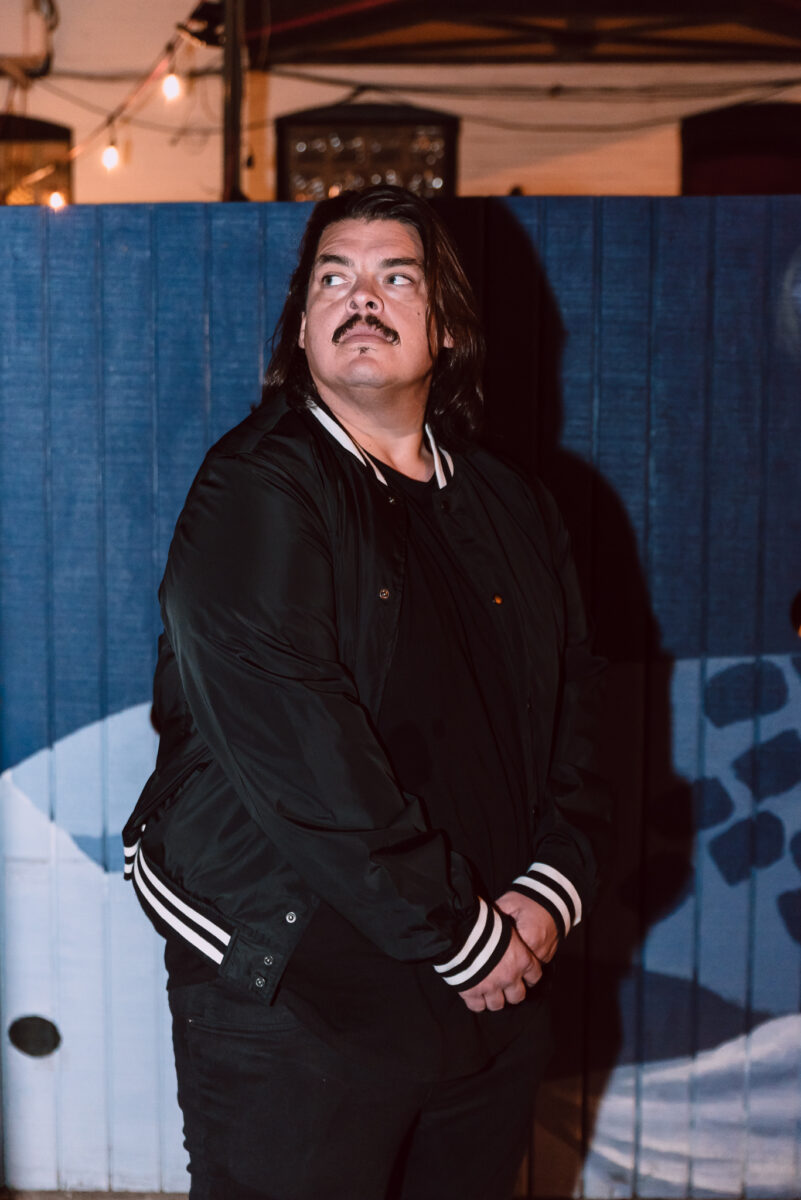
MH: That has gotta be weird.
JC: Yeah.
MH: Wait, go back – when did Forever Came Calling first start? I know it had been a few years by the time I even knew you.
JC: Honestly, I started the band when I was in high school.
MH: And you’re 35 now?
JC: 35, yeah. I started the band when I was 17 with my friends Tim Lemos and Gabe Sanchez. We kept going through members, and I kept the name cuz it was always me writing the songs, and people would come and go. When John first came to the band [in] like 2008, that was when we really started. He was the first permanent, permanent-ish member. Then Bryce. We’re just – we’re late bloomers, very late bloomers.
A big part of the thing was, like, that was my identity for over half my life. You know – this is what I do. This is what I tell people. This is how I contribute to the world. And when I didn’t have that anymore, I was like, “fuck – this is crazy. It’s weird.”
MH: Who am I besides –
JC: These things I do, right.
MH: It’s a weird identity crisis, kind of.
JC: It’s a huge identity crisis! It is weird to be realizing that you are not just the things you do. Which is a weird sentence to say.
MH: Do you feel like that’s helped you when it comes to doing Forever Came Calling at all? Can you appreciate it more?
JC: A hundred percent. I’m more dedicated to the band than I’ve ever been, which is weird.
MH: What do you mean? How so?
JC: I’m showing up. I literally think this is the best we’ve ever sounded. Noah has been drumming with me since fucking 2016 now. We needed a couple of people to fill in because life happened with the original guys, and Noah really stepped up. Seeing him step into that role of, like – he’s toured a little bit with us, he knows how it goes, and he’s teaching Logan [bass] and Joey [guitar]. It’s their first tour ever.
Something that Noah has brought in and kind of taught me is – Noah did his first tour with us when he was 17 or 18. He’s ten years younger than me, so it’s like my little brother. When he came back in and we started getting ready for tour this time, we both are on this big health journey that we were doing on our own. He is big into therapy, big into working out – we have a lot of the same interests, so he allowed me that space to be like, “dude, we’re gonna be good.” And we remind each other, “We know how to do this. Let’s just not fuck it up.”
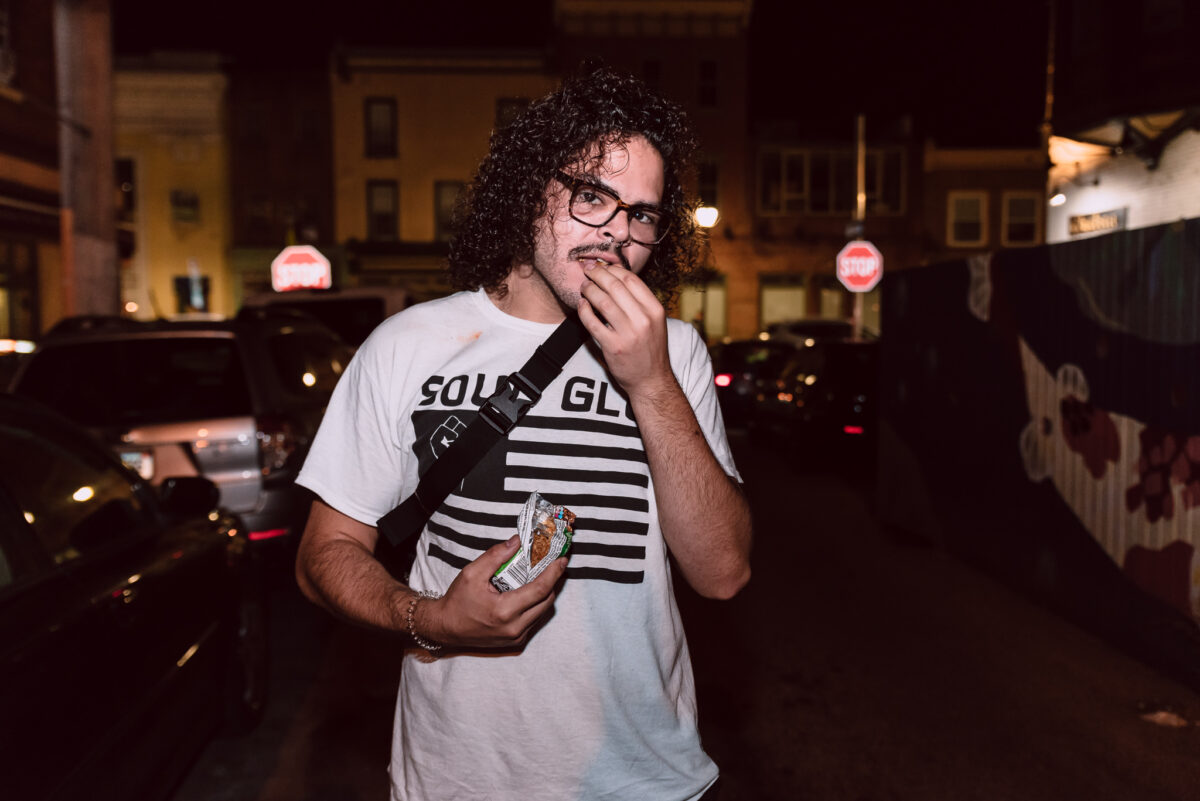
It’s weird; I used to get so upset and be like, “We’ve gotta be perfect and tight,” but I always would feel like we’d fuck up. And now I’m more dedicated, meaning I’m more intentional. So it’s just like, “No, I know what I have to do.” I know what I’m here to do, and I’m gonna do it to the best of my ability that night. What that is, we’ll both see. It’s cool to have that confidence and know that I know how to fucking do this. I’m not here by dumb luck. I know that now. I think I didn’t know that before.
MH: You’re having a lot more love and compassion for yourself, and you’re realizing, like, “oh, no – I’m good at this.” It’s weird!
JC: It’s weird. Super weird.
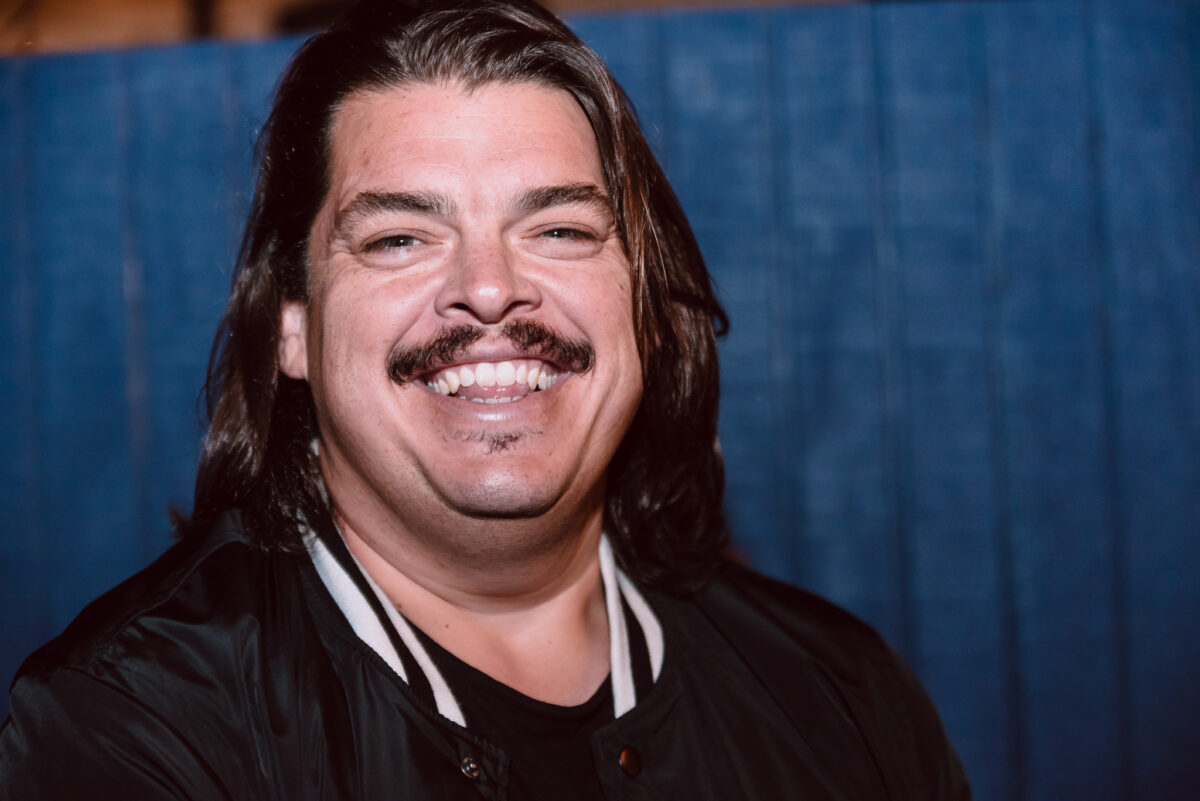
MH: I haven’t done an interview like this in three years. I walked up here and was like, “Wait – I’m good at this.” This feels really good to me to be here.
The last big thing I wanna touch on is, I understand you have another record you’re working on, Other Desert City Cities.
JC: Noah brought in a couple guys from Tucson. Cody [guitar on the Contender Ten Year Tour] is playing with us; he was in the band when I was in high school. So we’re all from the desert; we’re all in the Southwest. We live in Joshua Tree, which – Coachella’s big and all that. When you’re going down the 10 to go to Coachella, there’s a big sign that says, “other desert cities or Coachella.” Everybody goes to Coachella, but there’s this whole other world that I think is – better is relative, it depends on what you want to go do – but in my opinion, I like the idea of Other Desert Cities.
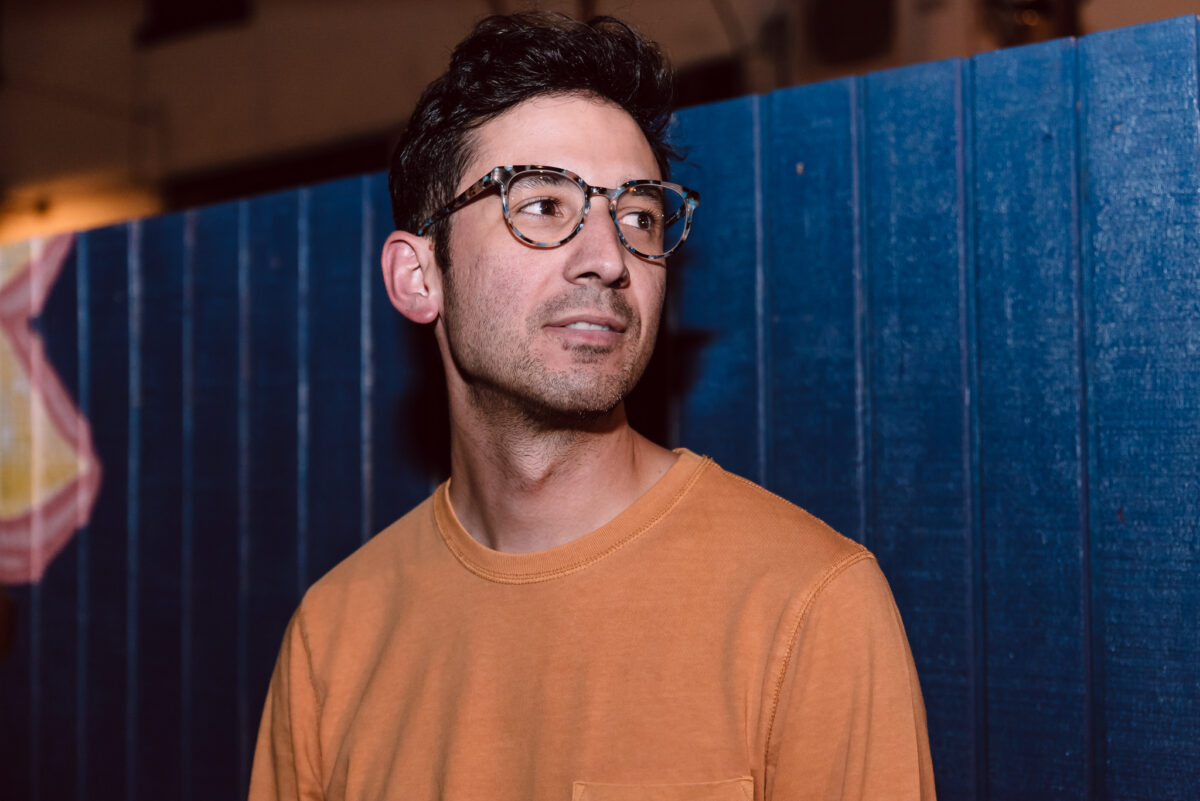
On this tour, we played a secret show in Tucson – not a secret, it was a last-minute show, and it was nuts. It was like, boom, a hundred people in a room. It was punk shit. The first stop on this tour was Odessa, Texas, because some of the first shows I was ever booked on were by my friends there, and this tour has to start there. It’s west Texas; it’s a desert city. That’s our energy – those weird, cool spots cuz we are those weird, cool kids.
And I love the idea of doing one more record. I always thought FCC was a three-record band, at least. We just didn’t get to the third one. I also have something to say now that I want to say.
MH: What do you have to say?
JC: I think there’s this whole experience that is happening in my life right now, and I know how I want to tell it. I have something of value to contribute. Even Retro Future – I’m not very proud of that record because I felt like I wasn’t in a great place mentally, and so it would suck for me to end this band on that. It would not feel good for me.
MH: You wanna end on something that not only is objectively good work, whatever that means – but work you feel proud of. The fact that you have a lot more compassion for yourself and self-love, that allows you to realize your stuff is good and make better stuff.
JC: Yeah! I’ve been working with Nick [Casasanto, guitar] from Knuckle Puck. He has a studio out in Landers, [Calif.], which is where I’m at. I’ve been writing with him – he’s a great fucking producer, and it’s cool that, like, he’s my friend, and we’re just having these ideas. We’re in the desert, doing desert shit, and it’s badass because – I don’t know what happens next with the band, but whatever it is, I think it’s gonna be special. I’m excited to see what that is.
MH: Is there anything you can throw out for timing for that?
JC: We’re gonna put out a new song in a couple weeks. I call it the close of the last chapter of the band. I did one song with Kyle Black [State Champs, Pierce The Veil, Paramore, etc.] in the winter of 2018. We got it all the way done, and it just never saw the light of day. We figured – we have it, why not put it out?
MH: Was this created separately from Retro Future?
JC: Yeah. Like I said, Kyle gave me space to write what was on my mind right as everything was happening. So I was just like, “Boom, it’s all in one song.”
MH: Something I meant to ask earlier, because we’re in Philly – the first time you played Philly, do you remember who that was with? Where that was?
JC: First time we played in Philly wasn’t even in Philly. I think it was Verona, New Jersey, does that sound right? It was a tattoo shop with Major League and Broadside and Giants At Large.
MH: Fuck – oh my god!
JC: They were on tour. Brian [Joyce, vocals/guitar] from Major League let us just live with him for like a week. And then he’s like, “my band’s starting a tour, do you wanna…” – he’s one of my favorite people. He’s one of the best human beings ever, straight up.
MH: Brian Joyce. This is a shout-out to you. I’m sure you’ll read this.
JC: Val Astaire – that shit is sick. Brian’s awesome. He just threw us on the show, and honestly, we made so many friends cuz we used to cover Brand New’s “70 Times Seven.”… And at the time, we were a three-piece when everybody was a five-piece. I think that was the big thing that set us apart initially was the fact that we were a three-piece that sounded like we were at least a four-piece. So yeah, it was, that was a, yeah. So that was the first one. It was nuts. I don’t even, like… it was crazy.
MH: I’m so glad we did this. Is there anything else you wanna add or anything else we didn’t touch on?
JC: Yeah. I think we got everything sick. Oh, we’re re-releasing Contender on vinyl. I think that’s it.
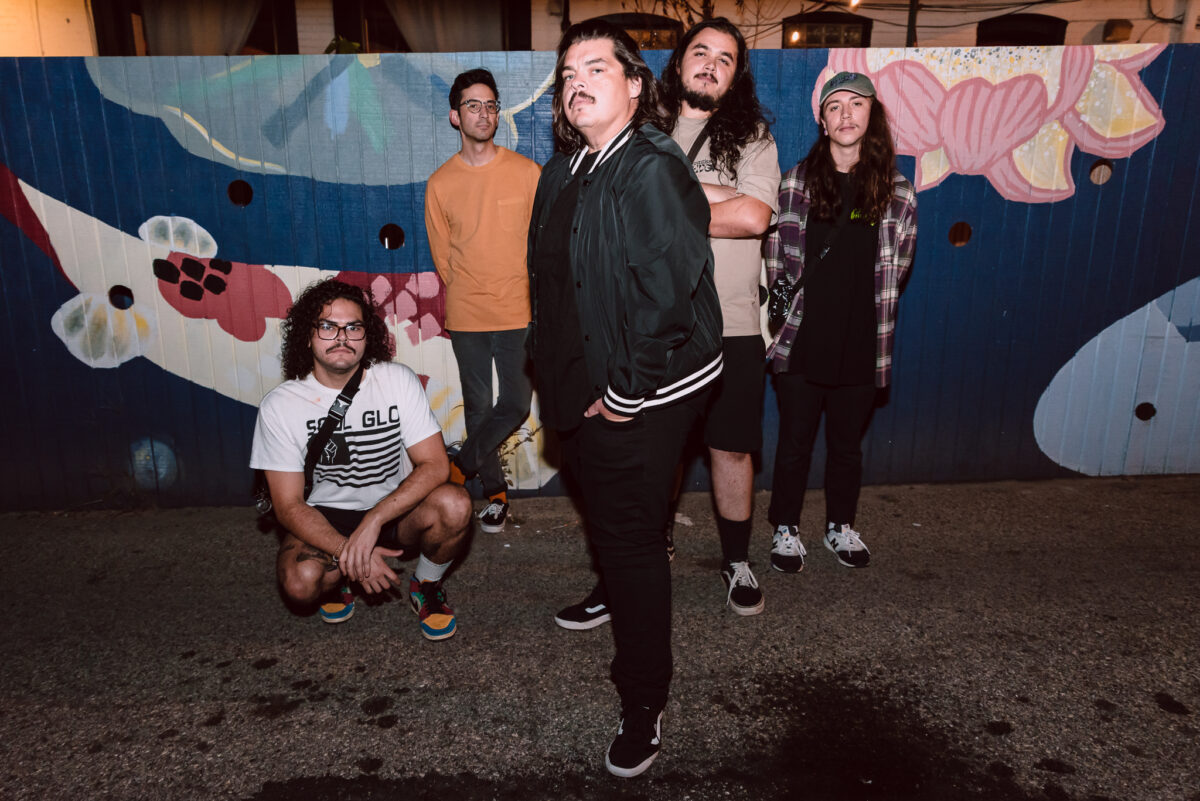
For more on Forever Came Calling, follow the band online:
http://otherdesertcity.com
http://linktr.ee/forevercamecalling
http://instagram.com/heyitsfcc
http://twitter.com/heyitsfcc
https://www.facebook.com/forevercamecalling

